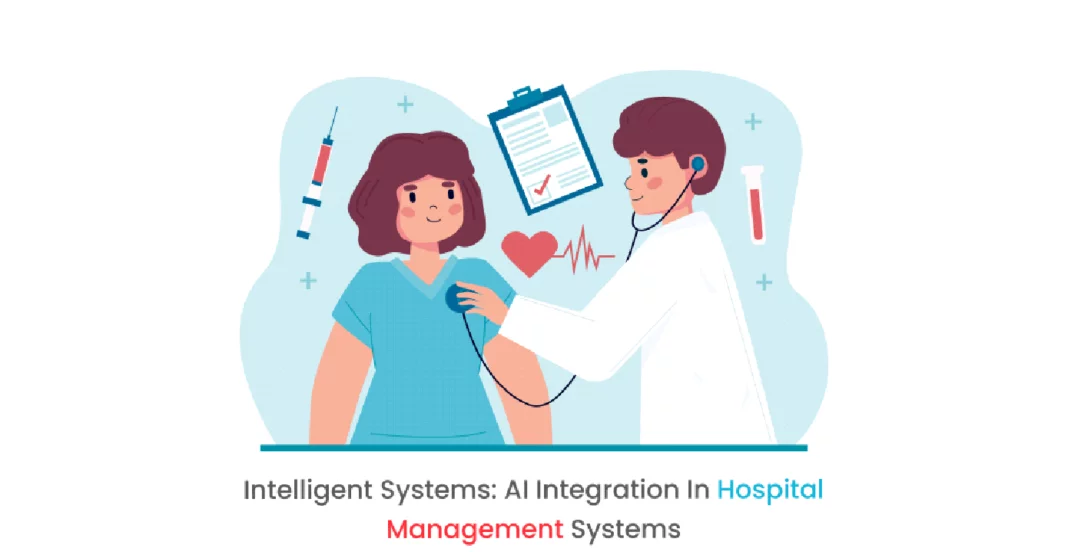Introduction
AI Integration of Hospital Management System (HMS) indicates the most apposite strand of healthcare progress in this digital age. The further development of healthcare systems implies a rise in complexity level which, on the other side, opens prospects for merging AI into hospital operations, resource management, and provision of care.
Advancing from streamlining patient workflow to preventing cases of diseases’ spread, AI-integrated solutions are ready with an unimaginable potential to build more efficient, effective, and patient-oriented healthcare systems.
Nowadays, technology is evolving at a rapid pace, therefore medical personnel, hospital managers, and governments must comprehend the capability of AI in clinic management systems. Using an in-depth analysis of currently ongoing processes, case studies, and prospects we can envision the leading way to a more intelligent, adaptable, and sustainable healthcare ecosystem.
Current Landscape of Hospital Management Systems
The contemporary field of Hospital Management Software portrays an assorted gamut of techniques and technologies that are designed to assist health facilities with their myriad operations. Initially, hospital management methods were built upon the foundation of mostly manpower, paperwork, and isolated software programs for individual tasks like patient scheduling, billing, and inventory management.
1. Evolution:
The hospital queue management system has come a long way from being confined to only administrative operations to becoming encompassing frameworks that present a whole range of tasks.
Nowadays, they are intertwined using modules like the electronic health records (EHR) module, the revenue cycle management (RCM) module, the clinical decision support (CDS) module, and the supply chain management module among many others.
2. Digitalization:
The prevailing digital transformation has been the main reason for the revolution in the process of hospital management system india. The emergence of electronic health records (EHR) as the main turf for the digitization process helps medical workers to electronically store and retrieve patient information, which in turn accelerates clinical workflows and makes sharing data among healthcare providers seamless.
3. Interoperability:
Interoperability has become an indispensable attribute of adequate management systems in hospitals since it allows the transfer of patient data in full measure from one healthcare setting or system to another.
The establishment of standards that are increasingly looking like HL7 (Health Level Seven) and FHIR (Fast Health Interoperability and Resources) serve the same purpose of interoperability and data transmission.
4. Integration of AI and Analytics:
The hospital management system advantages are using an air of artificial intelligence (AI) and analytics abilities in the Hospital Management System, to get the patient’s information and support their operations and services to the patient’s outcomes.
AI-dependent solutions are already widely applied for accurate prediction, population health management, personalized medicine, and service optimization.
5. Cloud-based Solutions:
The use of cloud technology in hospital management system modules has become popular among users and it gives them the ability to use various features such as scalability, flexibility, and cost-effectiveness.
Cloud-based systems give hospitals a way to get to their data and applications when needed, enable collaboration among healthcare professionals, and free them from the task of taking care of on-premises technologies.
Cost Savings and Efficiency Gains:
Additionally, healthcare cost reduction is considered a vital dimension, which is expected to accomplish two tasks at the same time: keeping the costs down and improving the quality of service. These reforms are undertaken by steady progress through process streamlining, a decrease of waste, optimization of resource allocation, and adopting technologies, which can automate simple tasks and enhance decision-making. Illustrations can be given EHRs, using telemedicine for virtual consultation, and collecting data using predictive analytics to predict patient needs and resource requirements.
Revenue Generation Opportunities:
In the healthcare industry, revenue generation does not merely mean that the providers offer hospital management system online services; instead, it refers to the more comprehensive development of business techniques that ensure profitability while maintaining the quality of services. This can be doing additional services or special cases as well as taking part in value-based reimbursement models, building new facilities and services to reach a wider customer base, or allocating resources to research and development facilities that can help produce new drugs or technological advancements.
Value-based Care and Population Health Management:
The central concept underlying value-based care is the revision of perspectives from counting the services to evaluating and assessing provided care quality and its results. It provides for preventive rather than curative care and it integrates a balance of care coordination to help improve the health outcomes of the patients without incurring much cost. In this way population health management is an extension of patient management as it focuses on the health needs and outcomes of entire populations subset for the health outcomes of individuals who make up these populations. It involves the selection and elimination of gaps, the development of individual and community-level interventions, and the use of data analytics which is used to target resources that are effectively put to their best use.
Conclusion
In sum, the inclusion of AI into the Hospital Information Management System is an important milestone for the healthcare sector that can improve the quality and efficiency of care delivered to patients.
Healthcare systems that put smart systems to use may achieve a variety of ways that include increased efficiency, the ability to decrease medical costs, increase in revenues, and among others, value-based care and population health management.
AI-based technologies are efficient for automating administrative jobs and allocating resources as well as aid in making merited decisions. Utilizing their analytics to robotic process automation, these utilities help in operating hospitals more effectively while at the same time, immersing the patients in better outcomes and experiences.
